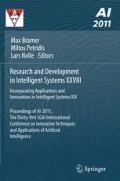Abstract
The relevance of the multi-armed bandit problem has risen in the past few years with the need for online optimization techniques in Internet systems, such as online advertisement and news article recommendation. At the same time, these applications reveal that state-of-the-art solution schemes do not scale well with the number of bandit arms. In this paper, we present two types of Successive Reduction (SR) strategies - 1) Successive Reduction Hoeffding (SRH) and 2) Successive Reduction Order Statistics (SRO). Both use an Order Statistics based Thompson Sampling method for arm selection, and then successively eliminate bandit arms from consideration based on a confidence threshold. While SRH uses Hoeffding Bounds for elimination, SRO uses the probability of an arm being superior to the currently selected arm to measure confidence. A computationally efficient scheme for pairwise calculation of the latter probability is also presented in this paper. Using SR strategies, sampling resources and arm pulls are not wasted on arms that are unlikely to be the optimal one. To demonstrate the scalability of our proposed schemes, we compare them with two state-of-the-art approaches, namely pure Thompson Sampling and UCB-Tuned. The empirical results are truly conclusive, with the performance advantage of proposed SRO scheme increasing persistently with the number of bandit arms while the SRH scheme shows similar performance as pure Thompson Sampling. We thus believe that SR algorithms will open up for improved performance in Internet based on-line optimization, and tackling of larger problems.
Access this chapter
Tax calculation will be finalised at checkout
Purchases are for personal use only
Preview
Unable to display preview. Download preview PDF.
References
D. Agarwal, B.-C. Chen, and P. Elango. Explore/exploit schemes for web content optimization. In ICDM, 2009.
R. Agrawal. Sample mean based index policies with o(log n) regret for multi-armed bandit problem. Advances in Applied Probability., 27:1054–1078, November 1995.
P. Auer, N. Cesa-Bianchi, and P. Fischer. Finite time analysis of multi-armed bandit problem. Machine Learning, 27(2-3):235–256, 2002.
D. Chakrabarti, R. Kumar, F. Radlinski, and E. Upfal. Mortal multi-armed bandits. In NIPS, 2008.
O. Chapelle and L. Li. An empirical evaluation of thompson sampling. In ICML Workshop - Online Trading of Exploration and Exploitation 2, 2011.
H. A. David. Order Statistics, volume 1 of Wiley Series in Probability and Mathematical Statistics, chapter 1, pages 1–32. John Wiley and Sons, Inc., second edition, 1981.
J. C. Gittins. Bandit processes and dynamic allocation indices. Journal of Royal Statistical Society. Series B, 41(2):148–177, 1979.
T. Graepel, J. Q. Candela, T. Borchert, and R. Herbrich. Web-scale bayesian click-through rate prediction for sponsored search advertising in microsofts bing search engine. In ICML, 2010.
O.-C. Granmo. The bayesian learning automaton empirical evaluation with two-armed bernoulli bandit problems. Research and Development in Intelligent Systems XXV, pages 235–248, 2009.
O.-C. Granmo. Solving two-armed bernoulli bandit problems using a bayesian learning automaton. International Journal of Intelligent Computing and Cybernetics, 2(3):207–234, 2010.
A. K. Gupta and S. Nadarajah. Handbook of Beta Distribution and its applications. Marcer Dekker Inc., New York, 2004.
S. S. Gupta and S. Panchapakesan. Multiple Decision Procedures, volume 1 of Wiley Series in Probability and Mathematical Statistics, chapter 4, pages 59–93. John Wiley and Sons, Inc., second edition, 1979.
W. Hoeffding. Probability inequalities for sums of bounded random variables. Journal of the American Statistical Association, 58(301):13–30, 1963.
Jean-Yves, S. Bubeck, and R. Munos. Best arm identification in multi-armed bandits. In COLT, 2010.
T. L. Lai and H. Robbins. Asymptotically efficient adaptive bandit rules. Advances in Applied Mathemetics, 1985.
O. Maron and A. W. Moore. Hoeffding races: Accelerating model selection search for classification and function approximation. In NIPS, 1994.
B. C. May, N. Korda, A. Lee, and D. S. Leslie. Optimistic bayesian sampling in contextualbandit problems. Submitted to the Annals of Applied Probability.
T. Norheim, T. Brdland, O.-C. Granmo, and B. J. Oommen. A generic solution to multiarmed bernoulli bandit problems based on random sampling from sibling conjugate priors. In ICAART, 2010.
W. R. Thompson. On the likelihood that one unknown probability exceeds another in view of the evidence of two samples. Biometrika, 1933.
J. Wyatt. Exploration and inference in learning from reinforcement. Ph.D. thesis, University of Edinburgh, 1997.
Author information
Authors and Affiliations
Corresponding author
Editor information
Editors and Affiliations
Rights and permissions
Copyright information
© 2011 Springer-Verlag London Limited
About this paper
Cite this paper
Gupta, N., Granmo, OC., Agrawala, A. (2011). Successive Reduction of Arms in Multi-Armed Bandits. In: Bramer, M., Petridis, M., Nolle, L. (eds) Research and Development in Intelligent Systems XXVIII. SGAI 2011. Springer, London. https://doi.org/10.1007/978-1-4471-2318-7_13
Download citation
DOI: https://doi.org/10.1007/978-1-4471-2318-7_13
Published:
Publisher Name: Springer, London
Print ISBN: 978-1-4471-2317-0
Online ISBN: 978-1-4471-2318-7
eBook Packages: Computer ScienceComputer Science (R0)

